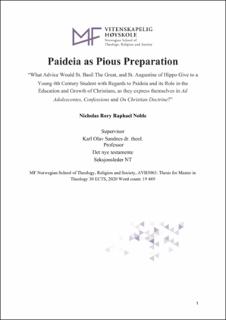Paideia as Pious Preparation : “What advice would St. Basil The Great, and St. Augustine of Hippo give to a young 4th century student with regards to Paideia and its role in the education and growth of Christians, as they express themselves in Ad Adolescentes, Confessions and On Christian Doctrine?”
Master thesis
Permanent lenke
https://hdl.handle.net/11250/2734513Utgivelsesdato
2020Metadata
Vis full innførselSamlinger
Sammendrag
Background
This thesis addresses the questions raised by the discovery of the Papyri Bouriant, particularly the notebook of a young, presumably Christian schoolboy, learning Homer’s works in the 4th Century CE. As established in Karl Olav Sandnes’ work The Challenge of Homer the boy is learning what is deemed controversial by Christians in his time. The Greek Canon was full of heresies and immorality, and represented a challenge to the relatively small and maligned religion that Christianity was at that time.
The boy seems concerned by this judging by his annotating Christograms to each page as he writes down words from Homer. As established in The Challenge of Homer , many Church Fathers were involved in the debate about Encyclical Education. I focus, not exclusively, on St. Augustine of Hippo, and St. Basil the Great. These two offer nuanced and persuasive arguments aimed explicitly, and implicitly at younger men in their education.
The Problem
The research question is: “What Advice Would St. Basil The Great, and St. Augustine of Hippo Give to a Young 4th Century Student with Regards to Paideia and its Role in the Education and Growth of Christians, as they express themselves in Ad Adolescentes, Confessions and On Christian Doctrine ?”
Method
Through detailed textual analysis of the source materials, comparison to contemporary (4th Century) writers, and recent modern scholarship, I sketch out a nuanced position for each author, and attempt to extrapolate from their general rhetoric, what particular advice is plausible that they give the specific historical schoolboy in question.
Conclusions
Both authors, I conclude, would generally encourage the study of Greek Literature with caveats and cautions of what dangers they both suppose worthy of consideration. Greek Literature may be considered preparatory and foundational to the study of Scripture, when selectively read
